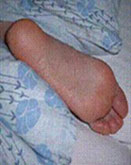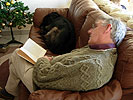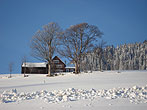| |
- After this hormone has peaked, another comes along called cortisol. This one peaks early in the morning. It goes to work on the membranes of the body and can also be an anti-stress hormone.
- A further hormone called melatonin is produced during the night and this is a natural tranquilliser.
|
The old adage, 'Early to bed and early to rise, makes a man or woman healthy, wealthy and wise', would appear to have a considerable degree of truth in it. Shakespeare wrote of sleep 'knitting up the ravelled sleeve of care.' And it is quite true. The frayed edges of our bodies are being knitted up again during this time.
Our brains have electrical waves that can be measured. Different waves occur at different times during the night. The deepest sleep occurs when we having delta waves. |
 |
These are long slow deep brain waves. In this sleep the cortex of our brain, where daytime conscious thought takes place, is recharged like a battery. During these times in the night our breathing is slow and deep, the heart rate slows down and our blood pressure drops. We are preparing chemically for another day of life.
There are other levels of sleep too.
First, drowsiness; then another, a stage lower, where we are almost or barely conscious of what is happening and then two average levels of sleep. But there is one other very intersting level of sleep. During this time we have rapid eye movements. It is sometimes called REM sleep. |
Brain waves speed up, the muscles become lax and soft, or make little jumpy movements and blood pressure can rise. This is when we dream. You might have seen this happening in a dog or a cat. If we are deprived of this type of sleep we become ill.
In this sleep the eyes are moving around all the time and it has been discovered that sometimes they do not not even rotate together, but work independently of each other! So when we are dreaming we are not actually focussing on what we 'see'. This kind of sleep is important for us. Babies have 40-50% REM sleep. Adults have a lot less.
What can we do to get a good nights sleep? |
 |
1. Have a bedtime ritual. A warm lazy bath, soft music, a soothing book, a warm bed, with the pillows plumped up, and only soft lighting in the room.
2. Make sure your feet are warm. If they are not, try washing your feet in a bowl of water with plenty of soap to remove the sweat of the day. Some people like to rub the soles of their feet with the half lemon shell left from their morning juice. Often it is the stale perspiration that feels cold and uncomfortable at bedtime. Have a secret pair of bed socks. |
3. Go to bed and flop with a slight smile on your face. Make all of you feel like a rag doll. You should be asleep in about 7 minutes. Consciously quieten your breathing rate from the anxious speed of the day.
4. Try to be in bed with the light out at 10.00pm
5. Keep to a routine so the your body knows what to prepare for. |
6. Go to bed on an empty stomach. This may mean changing your bed time routine and although a warm drink will help you sleep, if it is a food drink, this means that although you may be resting, your stomach still has to work. An empty stomach means a longer period of the deep sleep. You will soon adjust to this although it may be a big change.
7. Try to think of happy tranquil thoughts. Maybe you could read again some of the Bible verses in this article, and trust them to find peace of heart and mind. |
 |
|
<< Back | Page 1 | More >>
[ Home ] [ About Us ] [ Using The Gifts Of Creation ] [ Contact Us ]
Copyright © 2008 healthandhope.org.uk |
